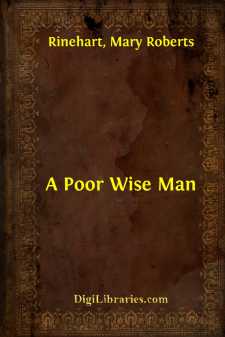Categories
- Antiques & Collectibles 13
- Architecture 36
- Art 48
- Bibles 22
- Biography & Autobiography 813
- Body, Mind & Spirit 142
- Business & Economics 28
- Children's Books 14
- Children's Fiction 11
- Computers 4
- Cooking 94
- Crafts & Hobbies 4
- Drama 346
- Education 46
- Family & Relationships 57
- Fiction 11829
- Games 19
- Gardening 17
- Health & Fitness 34
- History 1377
- House & Home 1
- Humor 147
- Juvenile Fiction 1873
- Juvenile Nonfiction 202
- Language Arts & Disciplines 88
- Law 16
- Literary Collections 686
- Literary Criticism 179
- Mathematics 13
- Medical 41
- Music 40
- Nature 179
- Non-Classifiable 1768
- Performing Arts 7
- Periodicals 1453
- Philosophy 64
- Photography 2
- Poetry 896
- Political Science 203
- Psychology 42
- Reference 154
- Religion 513
- Science 126
- Self-Help 84
- Social Science 81
- Sports & Recreation 34
- Study Aids 3
- Technology & Engineering 59
- Transportation 23
- Travel 463
- True Crime 29
A Poor Wise Man
Categories:
Description:
Excerpt
CHAPTER I
The city turned its dreariest aspect toward the railway on blackened walls, irregular and ill-paved streets, gloomy warehouses, and over all a gray, smoke-laden atmosphere which gave it mystery and often beauty. Sometimes the softened towers of the great steel bridges rose above the river mist like fairy towers suspended between Heaven and earth. And again the sun tipped the surrounding hills with gold, while the city lay buried in its smoke shroud, and white ghosts of river boats moved spectrally along.
Sometimes it was ugly, sometimes beautiful, but always the city was powerful, significant, important. It was a vast melting pot. Through its gates came alike the hopeful and the hopeless, the dreamers and those who would destroy those dreams. From all over the world there came men who sought a chance to labor. They came in groups, anxious and dumb, carrying with them their pathetic bundles, and shepherded by men with cunning eyes.
Raw material, for the crucible of the city, as potentially powerful as the iron ore which entered the city by the same gate.
The city took them in, gave them sanctuary, and forgot them. But the shepherds with the cunning eyes remembered.
Lily Cardew, standing in the train shed one morning early in March, watched such a line go by. She watched it with interest. She had developed a new interest in people during the year she had been away. She had seen, in the army camp, similar shuffling lines of men, transformed in a few hours into ranks of uniformed soldiers, beginning already to be actuated by the same motive. These aliens, going by, would become citizens. Very soon now they would appear on the streets in new American clothes of extraordinary cut and color, their hair cut with clippers almost to the crown, and surmounted by derby hats always a size too small.
Lily smiled, and looked out for her mother. She was suddenly unaccountably glad to be back again. She liked the smoke and the noise, the movement, the sense of things doing. And the sight of her mother, small, faultlessly tailored, wearing a great bunch of violets, and incongruous in that work-a-day atmosphere, set her smiling again.
How familiar it all was! And heavens, how young she looked! The limousine was at the curb, and a footman as immaculately turned out as her mother stood with a folded rug over his arm. On the seat inside lay a purple box. Lily had known it would be there. They would be ostensibly from her father, because he had not been able to meet her, but she knew quite well that Grace Cardew had stopped at the florist's on her way downtown and bought them.
A little surge of affection for her mother warmed the girl's eyes. The small attentions which in the Cardew household took the place of loving demonstrations had always touched her. As a family the Cardews were rather loosely knitted together, but there was something very lovable about her mother.
Grace Cardew kissed her, and then held her off and looked at her.
"Mercy, Lily!" she said, "you look as old as I do."
"Older, I hope," Lily retorted....












